
Introduction
Advanced Indexing techniques, including covering, partial, and composite indexes, are crucial for optimizing SQL query performance and achieving faster data retrieval. Dive into these methods to significantly boost your database efficiency and build high-performance applications. Read More
Advanced Indexing Strategies for Complex Queries
When working with large databases, optimizing query performance becomes crucial. Beyond basic indexing, advanced indexing strategies can significantly improve SQL query efficiency. This article explores key advanced indexing techniques that can help you optimize complex queries.
Covering Indexes
A covering index includes all the columns a query needs, allowing the database to retrieve data solely from the index without accessing the table. This reduces I/O operations and speeds up query execution.
Example:
CREATE INDEX idx_orders_covering ON orders (customer_id, order_date, total_amount);
SELECT customer_id, order_date, total_amount FROM orders WHERE customer_id = 123;Why it works: The query can fetch all required columns directly from the index, avoiding table lookups.
Composite Indexes
A composite index (multi-column index) is beneficial when queries filter or sort using multiple columns together. The column order in a composite index matters.
Example:
CREATE INDEX idx_orders_composite ON orders (customer_id, order_date);
SELECT * FROM orders WHERE customer_id = 123 AND order_date > '2024-01-01';Why it works: A composite index improves performance when both customer_id and order_date are used in the query.
Partial Indexes
A partial index indexes only a subset of rows based on a condition, reducing storage and improving performance.
Example:
CREATE INDEX idx_high_value_orders ON orders (customer_id, total_amount) WHERE total_amount > 500;Why it works: Queries filtering total_amount > 500 benefit from a smaller, optimized index.
Function-Based Indexes
A function-based index allows indexing on expressions or computed values to optimize queries using functions.
Example:
CREATE INDEX idx_lower_email ON customers (LOWER(email));
SELECT * FROM customers WHERE LOWER(email) = 'test@example.com';Why it works: The index enables case-insensitive email lookups.
Bitmap Indexes (For Low-Cardinality Columns)
A bitmap index is useful for columns with low cardinality (few distinct values), such as boolean flags or categorical fields.
Example:
CREATE BITMAP INDEX idx_customer_status ON customers (status);Why it works: Efficient for queries filtering status values (Active, Inactive).
Choosing the Right Indexing Strategy
- Use covering indexes for SELECT queries that fetch frequently queried columns.
- Use composite indexes when filtering or sorting by multiple columns.
- Use partial indexes for queries that frequently filter on a specific condition.
- Use function-based indexes to optimize queries with computed expressions.
- Use bitmap indexes for categorical data with low distinct values.
Implementing these advanced indexing strategies can greatly enhance query performance, especially for large datasets and complex queries. Ensure you analyze query execution plans (EXPLAIN ANALYZE) to validate the impact of your indexing strategy.
By mastering these indexing techniques, you can significantly reduce query execution time and optimize database performance effectively.
Join Telegram | Join WhatsApp Channel
We hope this article was helpful for you and you learned a lot of new things from it. If you have friends or family members who would find it helpful, please share it to them or on social media.
Also Read:
- Mastering Pivot Table in Python: A Comprehensive Guide
- Data Science Interview Questions Section 3: SQL, Data Warehousing, and General Analytics Concepts
- Data Science Interview Questions Section 2: 25 Questions Designed To Deepen Your Understanding
- Data Science Questions Section 1: Data Visualization & BI Tools (Power BI, Tableau, etc.)
- Optum Interview Questions: 30 Multiple Choice Questions (MCQs) with Answers
Hi, I am Vishal Jaiswal, I have about a decade of experience of working in MNCs like Genpact, Savista, Ingenious. Currently i am working in EXL as a senior quality analyst. Using my writing skills i want to share the experience i have gained and help as many as i can.
